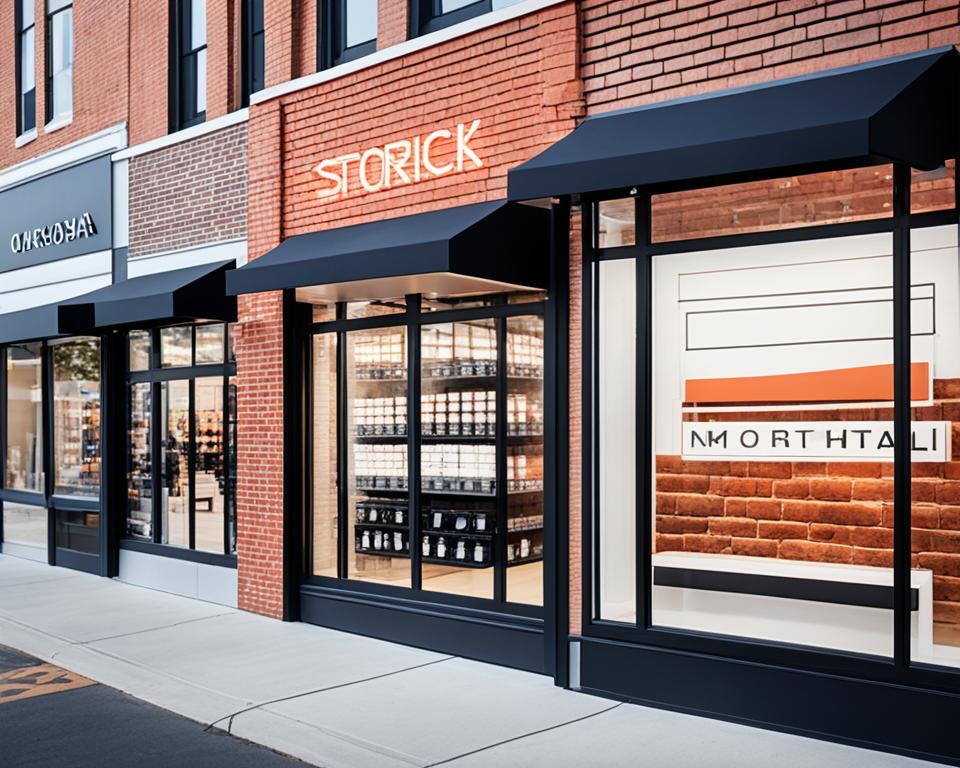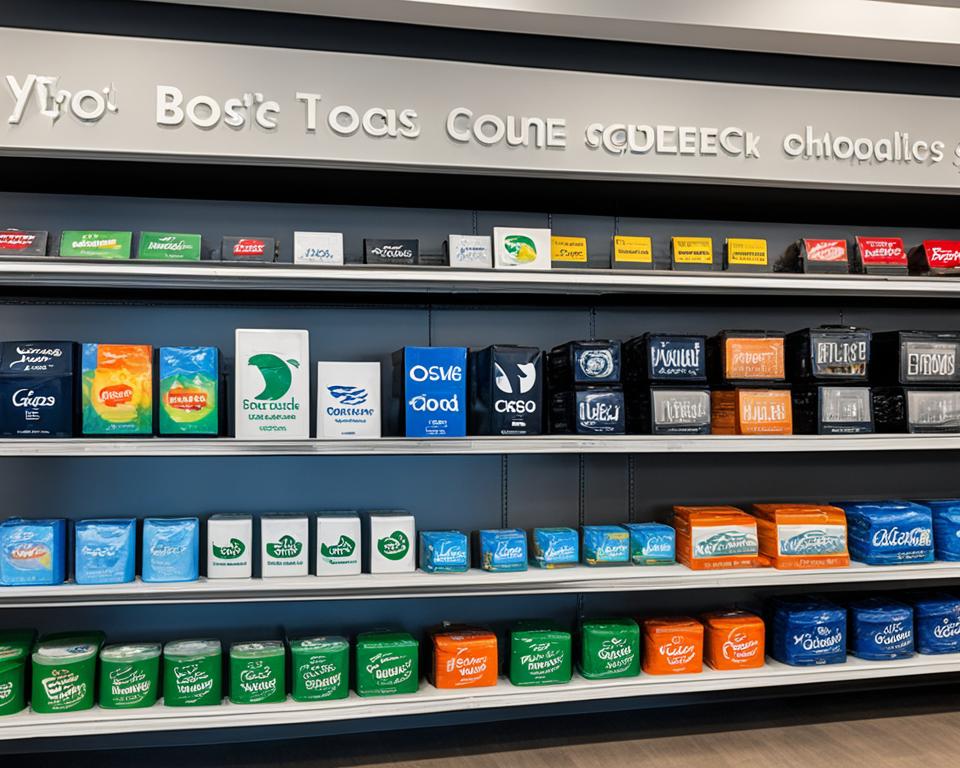While many brands have embraced the world of online retail, there are still some that choose to stick to traditional brick and mortar stores. These brands opt for a non-web retail strategy and focus on providing unique retail experiences for their customers. In this article, we will explore the allure of brands that don’t sell online and delve into why they make this choice, despite the prevalence of ecommerce.
Table of Contents
ToggleKey Takeaways
- Brands that choose not to sell online prioritize in-person shopping experiences and personal interaction.
- Exclusivity and limited availability are key factors that attract customers to brick and mortar stores.
- Non-web retail brands focus on targeting local markets and supporting local businesses.
- Avoiding online challenges, such as competition and high return rates, is a benefit of not selling online.
- Building brand trust and reputation through in-person interactions is a major advantage for brands that don’t sell online.
The Appeal of Traditional Retail Experiences
For brands that don’t sell online, the appeal lies in offering customers a unique and immersive retail experience. Unlike online shopping, where customers rely on product descriptions and images, traditional retail allows customers to see, touch, and try products before making a purchase. In-person shopping also provides an opportunity for personal interaction with knowledgeable staff who can offer advice and assistance. This hands-on experience creates a stronger emotional connection between customers and the brand.
When customers step into a brick and mortar store, they experience the atmosphere and ambiance created by the physical space. They can interact with products firsthand, examining their quality, testing their functionality, and assessing their suitability. This tangible experience instils a sense of confidence and reassurance in customers, as they can rely on their own senses to make informed decisions. The ability to physically engage with products fosters a deeper connection between customers and the brand’s offerings.
Furthermore, in-person shopping allows for personal interaction between customers and knowledgeable staff members. Brand ambassadors and sales representatives can provide valuable guidance, answering questions and offering expert advice on product selection, usage, and maintenance. This personalized assistance adds value to the shopping experience and strengthens the customer’s trust in the brand.
Hands-On Experience and Emotional Connection
The hands-on experience of traditional retail engagements triggers a range of emotions and sensations that cannot be replicated in the online space. The tactile nature of interacting with products provides a sensory experience that stimulates curiosity, excitement, and satisfaction. Customers can appreciate the weight, texture, and craftsmanship of items, enhancing their overall shopping experience.
Moreover, the personal interaction with staff members fosters a sense of familiarity and connection. Customers feel seen, valued, and understood, building a relationship with the brand based on trust and rapport. This personal touch creates a lasting impression and can lead to customer loyalty and repeat business.
Creating Lasting Memories
Traditional retail experiences have the power to create lasting memories for customers. Whether it’s browsing through charming boutiques or exploring immersive flagship stores, in-person shopping offers an element of discovery and surprise. The physical environment, thoughtful visual merchandising, and engaging store layouts add to the overall ambiance, making each shopping trip a memorable event.
In conclusion, traditional retail experiences provide customers with an immersive and meaningful shopping journey. Through in-person shopping, customers can engage with products, benefit from personalized assistance, and build emotional connections with the brand and its offerings. While online shopping offers convenience, traditional retail captures the essence of a hands-on experience that fosters trust, loyalty, and memorable moments.
The Exclusivity Factor
Brands that don’t sell online often leverage the exclusivity factor to attract customers. By limiting their availability to physical stores, these brands create a sense of rarity and uniqueness.
Customers may feel a sense of urgency to purchase products that are only available in-store, knowing that they may not be able to find the same items elsewhere. This exclusivity adds value to the brand and can increase customer loyalty.
- Exclusivity creates a premium experience: When customers have access to unique products or limited edition items that are only available in-store, it elevates their shopping experience. They feel privileged to own something that not everyone can have.
- Limited availability drives desire: Scarcity is a powerful motivator. When customers know that a product is in limited supply and may not be restocked, it creates a sense of urgency and FOMO (fear of missing out). This can prompt them to make a purchase straight away, rather than risk losing the opportunity.
- Unique products stand out: Brands that don’t sell online often focus on offering one-of-a-kind or bespoke products that can only be found in their physical stores. These unique offerings differentiate the brand from their online competitors and appeal to customers seeking something special.
- Creating a sense of exclusivity builds brand loyalty: When customers feel a strong connection with a brand and feel like they are part of an exclusive community, they are more likely to become loyal advocates. By offering exclusive products and limited availability, brands can foster this loyalty and build long-term relationships with their customers.
Targeting Local Markets
Non-web retail brands understand the importance of local markets and actively engage with their communities. By operating physical stores, we contribute to the local economy and support local businesses. Our organization, Artisan Furniture Europe, is proud to be a pillar of the community, building strong relationships with our customers.
Community engagement is an essential aspect of our business strategy. We participate in local events, sponsor community initiatives, and collaborate with other local businesses. By doing so, we demonstrate our commitment to supporting the growth and development of the area we serve. This sense of community engagement creates a special bond with our customers.
Supporting Local Businesses
One of our core values is supporting local businesses. We source materials from local suppliers whenever possible, which not only helps the local economy but also ensures the authenticity and quality of our products. We believe in the importance of fostering collaboration within our community.
When customers choose us, they aren’t just buying furniture; they are actively contributing to the success of local businesses. This support allows us to continue providing exceptional products and services to our customers while strengthening the economic fabric of our community.
Furthermore, our commitment to supporting local businesses extends beyond our operations. We actively promote other local brands and highlight their products in our stores. By doing so, we create a space that showcases the best of the local market, providing a unique and diverse shopping experience for our customers.

Fostering Customer Loyalty
Targeting local markets and engaging with the community fosters customer loyalty. When customers feel a connection to the community, they are more likely to choose local businesses like ours. By operating in physical stores, we have the opportunity to develop personal relationships with our customers, understand their needs, and provide tailored experiences.
Our team takes pride in offering exceptional customer service and creating a warm and welcoming atmosphere in our stores. We strive to make every customer feel valued and appreciated. This personalized approach builds trust and loyalty, making our customers more likely to return and recommend us to others.
Overcoming Online Challenges
While online retail offers numerous advantages, it also presents unique challenges for brands. In the highly competitive online marketplace, countless brands are vying for customers’ attention. This intense competition makes it increasingly challenging for brands to stand out and attract their target audience.
Additionally, online shopping often leads to high return rates, which can be detrimental to a brand’s profitability. Sizing issues, quality concerns, and customer expectations are common reasons why customers choose to return products purchased online. These return rates not only result in financial losses but also impact customer satisfaction and trust.
By not selling online, non-web retail brands can bypass these challenges. Instead of focusing on outperforming competitors in the digital realm, they can prioritize providing a seamless and satisfying in-person shopping experience. This allows them to engage directly with customers, address their specific needs, and build strong relationships based on trust and personalized service.
Building Brand Trust and Reputation
When it comes to brands that don’t sell online, one of their greatest advantages lies in their ability to build strong brand trust and reputation through in-person interactions. At Artisan Furniture Europe, we understand the importance of providing exceptional customer service, personalized recommendations, and a genuine experience. These elements help to cultivate customer confidence and authenticity, which are key factors in establishing a solid brand reputation.
By offering personalized assistance and expert guidance, we strive to create a positive and memorable shopping experience for each customer. Our knowledgeable staff are always on hand to answer questions, provide product demonstrations, and offer tailored recommendations based on individual needs and preferences.
Furthermore, our commitment to transparency and honesty ensures that customers can trust in the quality and authenticity of our handcrafted furniture. We believe that building trust is an ongoing process, and we continuously strive to exceed customer expectations and deliver on our promises.
This dedication to exceptional customer service and genuine experiences has resulted in a strong reputation for Artisan Furniture Europe. Satisfied customers not only become loyal patrons but also act as brand ambassadors, spreading positive word-of-mouth referrals to their friends and family.
The Benefits of Brand Trust and Reputation
- Customer loyalty: When customers trust a brand, they are more likely to become repeat customers, leading to increased customer loyalty and retention.
- Positive word-of-mouth: Satisfied customers who trust a brand are more likely to share their positive experiences with others, generating valuable word-of-mouth referrals.
- Increased sales: Brand trust and reputation can have a direct impact on sales, as customers are more likely to choose a brand they trust over competitors.
- Enhanced credibility: A strong brand reputation helps to establish credibility in the marketplace and positions Artisan Furniture Europe as a reliable and trustworthy choice for customers.
We continue to prioritize building brand trust and reputation through our unwavering commitment to exceptional customer experiences. By focusing on the power of in-person interactions, we believe that brick and mortar brands like ours can continue to thrive in an increasingly digital world.
Adapting to Changing Consumer Preferences
As non-web retail brands, we recognize the importance of keeping up with changing consumer preferences. While our focus remains on providing exceptional in-person retail experiences, we understand the need to incorporate modern strategies that cater to the evolving needs of our customers. To achieve this, we have adopted hybrid retail models that merge the convenience of online shopping with the experiential aspects of visiting our physical stores.
Our hybrid retail models allow customers to browse and purchase our products online while still enjoying the unique allure of brick and mortar stores. By offering a seamless shopping experience across multiple channels, we can cater to the preferences of our customers and meet them wherever they choose to engage with our brand. Whether online or in-store, our goal is to provide a delightful and personalized shopping journey.
- Customers can explore our wide range of products on our website, taking advantage of the convenience of online shopping.
- They have the option to make their purchases online and have them delivered to their doorstep.
- Alternatively, customers can choose to visit our physical stores, where they can experience our products firsthand, receive personalized recommendations, and seek assistance from our knowledgeable staff.
By embracing omnichannel strategies, we strive to offer a seamless transition between online and offline experiences, ensuring our customers enjoy the best of both worlds. Whether they prefer the convenience of online shopping or the hands-on experience of in-person retail, we are dedicated to meeting their preferences and exceeding their expectations.
By blending the benefits of online retail with the unique offerings of our physical stores, we can adapt to changing consumer preferences without compromising the core values that set us apart. Our commitment to providing exceptional customer experiences remains unwavering, and we are excited to continue evolving alongside our customers.

Success Stories of Non-Web Retail Brands
Let us now explore some success stories of non-web retail brands that exemplify the unique retail experiences offered by brick and mortar stores. These brands have effectively carved a niche and captivated customers through their commitment to craftsmanship, personalized service, and seamless blending of online and offline strategies.
Artisan Furniture Europe
One shining example is Artisan Furniture Europe, a renowned brand that exclusively sells its exquisite handcrafted furniture through physical showrooms. By focusing on in-person experiences, Artisan Furniture Europe provides customers with the opportunity to see, feel, and appreciate the craftsmanship of their products. This unique retail experience has garnered a dedicated and loyal customer base who appreciate the attention to detail and personalized service offered by the brand.
Warby Parker and Glossier
Warby Parker and Glossier are two other brands that have successfully integrated online and offline strategies to create seamless shopping experiences. Warby Parker, an eyewear brand, allows customers to try on frames in-store and then conveniently purchase their preferred style online. Glossier, a leading skincare and cosmetics brand, enhances the in-store experience by incorporating interactive elements and expert guidance from their in-house beauty consultants.
These success stories demonstrate how non-web retail brands have leveraged the allure of brick and mortar stores to provide unique retail experiences. Whether it’s Artisan Furniture Europe’s exquisite showrooms or the seamless integration of online and offline strategies by Warby Parker and Glossier, these examples highlight the continued relevance and success of traditional retail in a digitally dominated world.
Future Trends for Non-Web Retail Brands
The future is brimming with exciting possibilities for non-web retail brands as emerging technologies pave the way for experiential retail. These cutting-edge advancements will shape the way customers interact with brick and mortar stores, offering immersive experiences and personalized recommendations for a truly tailored shopping journey. In this section, we’ll explore some of the future trends that will keep non-web retail brands at the forefront of the ever-evolving retail landscape.
-
Virtual and Augmented Reality
One of the most promising trends is the integration of virtual and augmented reality into the in-store experience. Imagine stepping into a store and being able to virtually try on clothes or visualize how furniture would look in your home. These technologies will revolutionize the way customers interact with products, providing a heightened sense of engagement and confidence in their purchase decisions.
-
Data Analytics for Personalization
Data analytics will play a crucial role in tailoring the shopping journey to individual customers. By leveraging customer data, non-web retail brands can gain valuable insights into their preferences, purchase history, and browsing behavior. This information can then be used to offer personalized recommendations, promotions, and discounts, creating a more meaningful and customized shopping experience.
-
Seamless Omnichannel Integration
Omnichannel strategies will continue to gain momentum, allowing non-web retail brands to seamlessly integrate their online and offline channels. Customers will enjoy a cohesive shopping experience across multiple touchpoints, whether it’s browsing products online, visiting a physical store, or making a purchase through a mobile app. This integration will ensure that customers can engage with the brand in a way that is most convenient for them, without compromising on the unique experiential aspects of in-person retail.
-
Smart Store Technologies
Smart store technologies, such as RFID tags, beacons, and IoT devices, will further enhance the in-store experience. These technologies can enable personalized product recommendations based on a customer’s location within the store, provide real-time inventory updates, and offer interactive displays that showcase additional product information. By seamlessly integrating technology into physical stores, non-web retail brands can create an environment that is both immersive and efficient.
The future holds immense potential for non-web retail brands to thrive by embracing emerging technologies and adopting innovative strategies. As customer expectations continue to evolve, these future trends will enable brick and mortar stores to deliver exceptional, customer-centric experiences that set them apart from their online counterparts. The image below illustrates the convergence of technology and retail, showcasing the endless possibilities for non-web retail brands.
Conclusion
Brands that don’t sell online provide customers with a unique and immersive retail experience. By focusing on traditional retail and prioritising customer experience, these brands can build trust, establish strong reputations, and foster local community engagement.
While the online marketplace continues to expand, the allure of brick and mortar stores persists, offering customers something beyond the convenience of online shopping. In-person shopping allows customers to see, touch, and try products, while also providing the opportunity for personal interaction and expert advice.
Non-web retail brands play a vital role in targeting local markets and supporting local economies. By operating physical stores, these brands become integral parts of the community, nurturing strong relationships with their customers. This sense of community engagement and support fosters customer loyalty and sets traditional retailers apart from their online counterparts.
As technology continues to evolve, non-web retail brands will adapt and find new ways to thrive in the changing retail landscape. Emerging technologies, such as virtual and augmented reality, will enhance the in-store experience, while data analytics will enable tailored recommendations and personalized shopping journeys. By embracing these advancements, traditional retail brands can continue to provide customers with memorable and engaging experiences.


